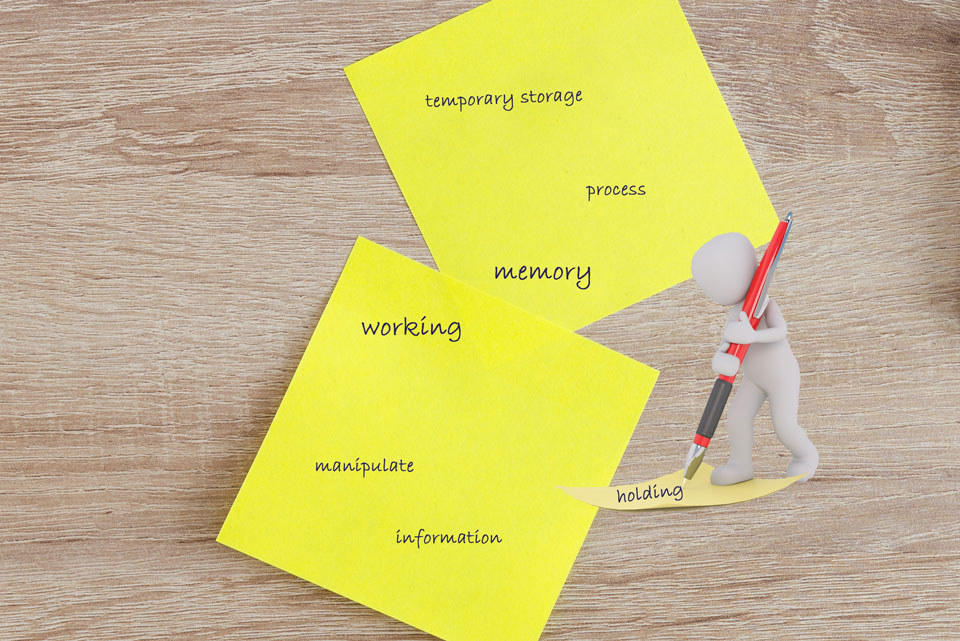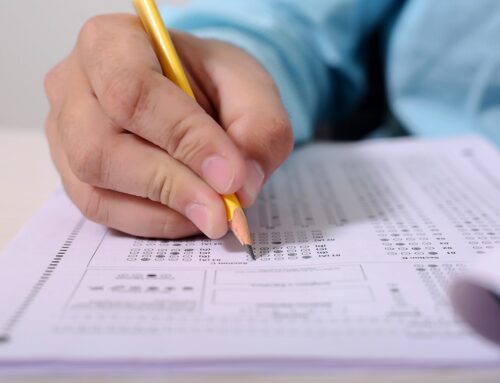What Is It?
One of the brain’s executive functions, working memory is the ability to hold new information in the short term whilst it is needed for a task. Often described as a mental “post-it” note, it is working memory that helps a person to keep a new piece of information in mind whilst performing an action related to that novel data.
It may sometimes be assumed that working memory is just another term for short-term memory, but this is not entirely accurate. Whereas short-term memory does indeed hold information, working memory is the ability not only to hold information, but to process and work with it, too. It may be useful to think of it as a helpful “holding cell” where information is retained and manipulated.
Comprising the central executive, visuospatial sketchpad, phonological loop, and episodic buffer, working memory is important both for learning and for everyday tasks. It allows a person to learn by associating new ideas with previous knowledge, and provides a temporary storage facility that allows a person to have conversations, do mental maths, or keep in mind instructions they have been given whilst also actually carrying them out. It is all about the ability to not just hold information, but to then be able to use, process, and manipulate it.
Difficulties with working memory may mean that a child finds it much harder to use the information that they are given in the classroom. They may have difficulty in carrying out tasks with multiple steps; find mental calculation very tricky; struggle to keep their place when reading and find problem-solving tasks particularly challenging.
Working memory difficulties may even look like poor behaviour; like a child is simply choosing not to listen, focus, or do what is asked of them, when in reality they are having difficulty retaining the information required to follow the instructions and complete the task. They may also interrupt classmates and not wait for their turn to ask a question in class. This seemingly poor or impulsive behaviour can stem from the fact that they are simply unable to hold on to that question for long enough to politely wait their turn.
Identifying issues with working memory is a key first step in supporting a child who may be struggling in this area. Once identified, it is possible to advocate for them with school in order to avoid the frustration of misunderstandings, and have a support plan put in place that combines helping to build a child’s skills in this area with mitigating some of the difficulties.
Working Memory Issues and High Learning Potential
The waters can be particularly muddy around a child with high learning potential, when it comes to ruling in or out issues with working memory. Sometimes, what looks like a working memory issue is, in fact, an attention issue, where the trouble does not lie with a difficulty in storing the information, but with the fact that the information was not taken in in the first place. This inattention may be due to a diagnosable condition, such as ADHD (and there may or may not be working memory difficulties in addition to, or part of, this diagnosis), but may also be due solely to a child’s high learning potential itself.
A child with high learning potential may, without any further diagnoses, display traits associated with working memory deficits or other diagnosable conditions that can cause inattention and lack of focus and yet, when stimulated, engaged and interested in the topic at hand, will have no such issues at all. The problem may simply be that of disinterest in certain areas and an unwillingness to pay attention. To complicate things further, even a child of high learning potential with working memory or attention deficits may also be able to demonstrate exceptional focus and perform well around themes of interest, because their long-term memory and expertise, together with high levels of motivation, can often go some way in making up for any deficits. It is, therefore, not as simple as keeping an eye out for universality of issues to confirm a working memory or attention deficit; a child’s high learning potential can make this a pointless exercise.
A further complication lies in the fact that young children with high learning potential, especially, are often very able to mask both working memory and attention issues because they are simply not challenged to the point at which the issue would manifest itself. Sometimes, it is necessary to wait until later in Key Stage 2 or secondary school, when demands are high enough, to evaluate if there really is an issue.
Careful consideration and investigation, therefore, may well be essential to discern either the true cause of presenting issues or to spot the issue in the first place. If it does, however, become clear that a working memory deficit exists, then there are many ways to support a child to manage and mitigate such difficulties.
Strategies to Support a Child’s Working Memory
1. Set up an environment that supports their working memory
- Break down tasks into clear and manageable steps; “chunk” information into bitesize bits.
- Use simple language, deliver information slowly, clearly and with minimal background noise or disruption.
- Repetition – be prepared to repeat instructions, and even ask the child to repeat the instructions back to you, both to check if they have taken in the information and to help cement the information into their working memory.
- Provide routine and structure. The familiarity of routines in lessons and elsewhere can help by reducing the amount of new information being required to be processed.
- Make the messaging multi-sensory. Provide information in a variety of different ways: writing, speaking, drawing, even throwing a ball back and forth while discussing the task; this use of different senses helps the working memory to really take on board the information.
- Advocate for your child’s needs in school so that not only can the kind of support outlined above be implemented, but misunderstandings can be avoided, and praise given when due.
2. Support your child to help themselves
Encourage them to develop their own memory aids and other helpful strategies.
- Encourage them to take notes in class, to have a notebook with the information on the day’s schedule, to write a journal or diary to keep the day’s events in mind. Suggest to-do lists and writing down the sequence of steps required for the completion of a task.
- Encourage connections. Connecting information both to feelings and emotions but also to prior knowledge helps new information to “stick”.
- Mnemonics – encourage them to make the information more memorable with a mnemonic (like “Never Eat Shredded Wheat” to remember the four directions on a compass …).
- Use visualisation to assist memory – guided imagery, mental rehearsing, imagining tasks visually, can all help to bolster the strength of the working memory – help make connections and make the memories “stick”.
- Encourage active reading – support your child in making notes, highlighting key data (if acceptable to do so!), popping in a post-it note at an important part of the book, even to read it aloud; all of these strategies can help working memory.
- Verbal rehearsal – saying the information out loud is simple but can be very effective.
- Turn them into the teacher! Get them to teach you about what they have been learning to further help them organise their ideas and help to really cement that information (and understanding) in their mind.
- Make their memories multi-sensory – mix it up and use all their senses to cement the information still further. Say the information out loud, then listen to someone else saying it back to them, then perhaps they could sing it, then type it, then trace it on the ground with a stick! This variety helps to make connection upon connection that really builds up the strength of the memory.
- Use their interests – if they love cartoon strips, get them to imagine a task as a cartoon strip in their head; if they are literary-orientated get them to devise mnemonics or rhymes to help the memory
- Support them to improve their organisational skills. Working memory can have a detrimental effect on organisational skills, so help them to discover strategies that work for them and keep an eye on whether they are being consistently utilised.
- Support them to have the confidence to ask for help. Encourage them to feel comfortable asking for help, when needed. To be struggling, at school or at home, and keeping quiet about it removes many chances for both practical and emotional support that can be key for both academic progress and overall wellbeing. They do not have to manage alone.
- Prioritise wellbeing. Worrying and anxiety use up valuable working memory. Being tired can also have a significantly detrimental effect on working memory. Focusing, therefore, on emotional wellbeing and getting a good night’s sleep, can be transformative for a child’s working memory.
For more information and advice on children with high learning potential and sleep, see our advice sheet, PA605, Sleep and High Learning Potential Children.
For more information on worry and anxiety in high learning potential children, see our advice sheet, PA606, Worry and Anxiety in High Learning Potential Children, and see the blogs section of our website for even more great advice.
3. Play Games to Help Improve Working Memory
- The tray game. The classic game where a selection of items are placed on a tray, time is given to memorise the items, then either they are covered up and a child has to try to recall all of the items, or one by one, items are removed and the name of the game is to notice which ones have gone. This is a great workout for the working memory!
- Word list games. There are so many variants, but all of them can help with working memory. Whether it is the suitcase game, the shopping list game, the zoo game or your own bespoke version, they all go along the lines of being a roundtable memory game where person one mentions one item (“I went to shop and I bought…”; “I went to the zoo and I saw…” etc), the next person must recall the item and add one of their own, the person after that must remember both previous items and then add their own, and so on.
- The requirement for keeping the numbers in your head while planning their placement on the grid utilises working memory and so is a useful game for training in this area.
- The need for strategy and anticipation, both of your own future moves and those of your opponent’s, is great for strengthening working memory.
- Card games. Many can help with working memory – Sushi Go, Love Letter, Crazy Eights, Uno, Go Fish, Old Maid to name but a few!
- For young children, a slightly more complicated variant of “Simon Says”, where you give more than one instruction (“Simon says sit down, blink twice and put your hands on your head”) can help their working memory.
There are also computer programmes which claim to help working memory; however, there are questions over the transferability of any memory gains to other tasks from such programmes, so caution should be exercised if considering such options.
Conclusion
If a child is struggling with their working memory, there is much to be done to support them. Encouraging them to build up their own bespoke set of strategies to help is both a practical and positive element of this support, and advocating for them at school and ensuring that the environment is set up to support them, is another key aspect. In addition to this, there are many fun and family-friendly ways to improve their working memory, without them even knowing they are doing so as they play! For more information on Working Memory, see our advice sheet, PA304, Working Memory – Tapping Potential.
More Information
- https://www.cognifit.com/science/cognitive-skills/working-memory
- https://www.merakilane.com/dont-forget-18-working-memory-games-and-strategies-for-kids/
- https://www.mentalfloss.com/article/64418/11-unforgettable-games-improve-your-memory
- https://www.theottoolbox.com/how-to-improve-working-memory/
- https://www.understood.org/en/school-learning/learning-at-home/homework-study-skills/8-working-memory-boosters
- McLeod, S. https://www.simplypsychology.org/working%20memory.html
- https://www.parentingscience.com/working-memory.html
- https://www.parentingscience.com/working-memory-tips.html
- Rosen, P. https://www.understood.org/en/learning-thinking-differences/child-learning-disabilities/executive-functioning-issues/working-memory-what-it-is-and-how-it-works
- https://childdevelopment.com.au/areas-of-concern/working-memory/
- Webb, J and Latimer, D. ADHD and Children Who Are Gifted. https://www.sengifted.org/post/adhd-and-children-who-are-gifted
About the author: Caroline Hooton-Picard is an adviser for Potential Plus UK. She has a background in mental health, having worked for Suffolk Mind and also in private practice, and has a first class degree in Philosophy from the University of Essex. She also has a High Learning Potential daughter who keeps her very much on her toes!






